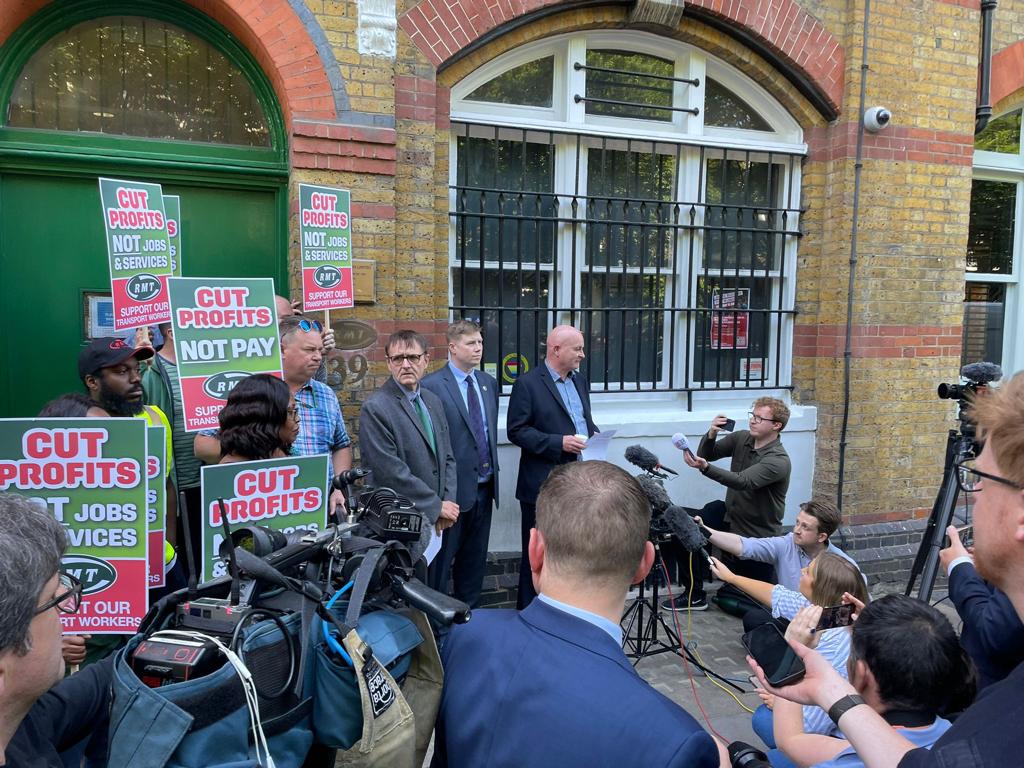This week begins one of the largest strikes of railway workers since 1989, as 50,000 RMT members and associated workers walk out on three separate days over disputes on pay freezes, non-compulsory redundancies, and in a separate dispute over pensions and job losses from the London Underground workers.
The facts on why these strikes should happen is plainly obvious, and ever murkier times ahead with a government failing to grasp the immensity of the cost of living crisis, puts them beyond necessity.
As to be expected, these drastic actions taken by the RMT have been vilified by the usual suspects. Conservative (and non-conservative) politicians, the media and ‘political commentators’ have repeated the same rhetoric against the union and its plan of action. Such individuals play dumb to not only the toil of being a low-paid railworker, but to the actual organisational structure of the rail system. One of these tactics of oversimplification has been the quotation of how much a train driver typically makes, who are in fact not the members of the workforce who are striking, and if so are doing it in solidarity with their fellow rail workers.
One of the wonderfully hypocritical critiques of the RMT strikes came from Times cartoonist Peter Brookes. Brookes depicts this scene of the rail worker(s) depriving other “key” workers of getting to their workplaces. Delightfully, this illustrates not only the greater value we should hold on the workers in all our transport services, but rather the simple socialist principle of the united struggle of the working-class.
My cartoon Saturday @TheTimes asks "what about all the other workers?" #RailStrikes pic.twitter.com/yGMnd6IoGo
— Peter Brookes (@BrookesTimes) June 18, 2022
This strike comes just after the TUC’s We Demand Better in London, Saturday 18, which saw the labour movement and other progressive organisations march in favour of higher wages for workers. Union activity is more necessary than ever after the pandemic and into the cost of living crisis.
One of the turns of phrase that was frequently used over the course of the pandemic by the government and the media was ‘key worker’. This term did have significant proper connotations during the pandemic when it came to the attendance of school children in schools in person. But often in context, it was a wider term used to describe any worker continuing to work in person throughout the spread of the virus in an often congratulatory context.
This expression isn’t wrong, in fact far more correct than given credit. Both public and private-sector workers helped at least keep the foundation of our society together, saving lives even in the face of what is a great and continuing catastrophe.
It’s obvious that the workers who suffered and were toiled the most through the pandemic were indeed NHS and any medical workers. We can remember the pleasant but seemingly pointless clapping outside our doors on the occasional day for the health service. Seemingly, the ‘thanks’ that was often also extended to other public sector key workers, including rail workers, now seems even more vapid and pointless.
So how is this the case? How after all that was lost and are still losing over the course of the pandemic do we only slightly value our health workers, and seemingly why do we not value other important sectors such as transport workers?
At this point, the ‘key workers’ that we thanked so frequently have become so disassociated with our own experience of society through manipulation by politicians, the media and the bourgeois that they are almost ‘dehumanised’. In the sense that the public, at fault of the aforementioned actors, have treated a wider grouping of people as a heroic organ, we have lost touch with the reality that many service workers are simply underpaid and mistreated.
As the word hero and ‘superhero’ have commonly been used in regard to the service workers throughout the pandemic, there is a metaphor hidden within this. If we were granted the presence of someone who had superpowers, wouldn’t it be a disgrace if they acted like mere mortals?
In this sense, the generalisation of the function of ‘key workers’ as heroic makes them far more easier to vilify. It’s nothing close to extraordinary what service workers have done to keep the country running, so when they show a human face, one of exploitation, then they are warped into villains by the evil actors of capitalism. And by many of our warped minds too.
So as quickly as rail workers have seemingly gone from ‘heroes’ to ‘villains’ in a typical case of the loss of Gattungswesen, this is a stark warning to the workers of Great Britain that the struggle of one trade is one of all. Whilst the Conservative government still tries to suck dry the remaining pride and patriotism it can manipulate into votes from our National Health Service in their continuing commendation of their response to the pandemic, NHS workers who take action in the future will almost certainly experience a similar fall in capitalist virtue.
As the anti-strike propaganda and it’s familiar form has already taken a hold on a generation who is well-used to the disruption that strikes and underpayment can cause, it should be easy to remind ourselves that action like this needs to be taken to avoid this fate of suffering through a cost of living crisis. The RMT should be commended, and taken an example of when it comes to action. This a call of action to not just join your associated union, but to engage, organise, and without flinching, to strike when necessary. Or soon we will all be thrown under the train.
One struggle is everyone’s struggle!
Read today’s RMT statement here
Howard Green, is a member of the YCL’s East of England branch



